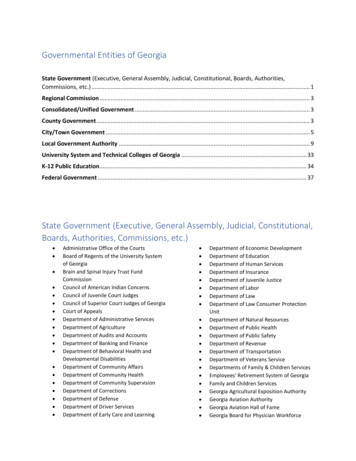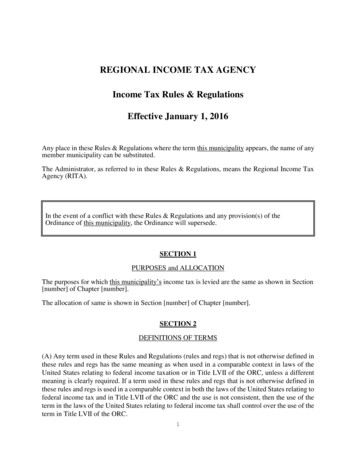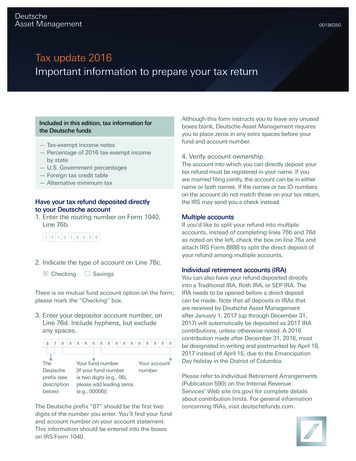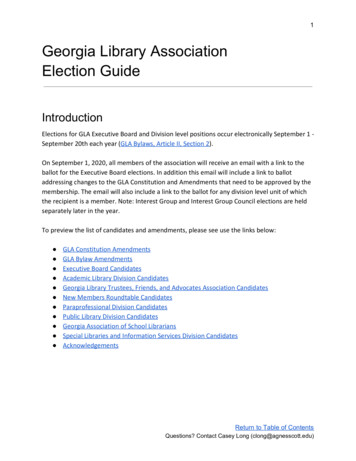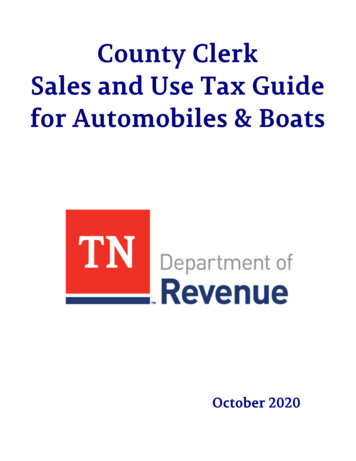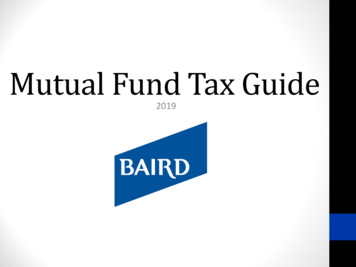
Transcription
A Tax Guide ForGeorgia Citizens2017 EditionGeorgia Department of Revenue1800 Century Boulevard, NE, Atlanta, GA 30345(877) 423-6711 dor.georgia.gov
Commissioner’s Letter2017A Tax Guide for Georgia Citizens contains a helpful summary of the various taxes that are collected inGeorgia.Whether you are a new resident or have lived in Georgia for some time, you should find this publicationinsightful and informative.For added convenience, the Department has 11 Regional Offices located throughout the State. Theirlocations and telephone numbers are listed on page 44.Another excellent source for Georgia tax information is our internet website at: dor.georgia.gov. The sitecontains the latest information, updates, press releases, publications, and provides a comprehensive listof downloadable tax forms.Our primary purpose in serving Georgia’s citizens is to help you – our customer. Our intent is to administerGeorgia’s tax laws in a manner that promotes confidence in our competence, fairness, and integritywith exceptional customer service. No matter when you request assistance, our goal is to ensure thatyour interaction with the Department of Revenue is a pleasant one.Respectfully submitted,Lynnette T. RileyState Revenue Commissioner
Table of ContentsA Tax Guide for Georgia Citizens . 1The Georgia Department of Revenue . 1Important Reminders . 2Taxpayer Services Division . 4Individual Income Tax . 4Withholding Tax . 6Corporate Income Tax . 8Corporate Income Tax Credits . 8Corporate Net Worth Tax . 10Estate Tax . 10Registration and Licensing .11Taxation of Banks and Mutual Financial Institutions .11Sales and Use Tax . 12Motor Fuel Tax . 17Motor Carrier Fuel Use Tax (IFTA) . 18Path 2 College 529 Plan . 19Local Government Services Division . 19Property and Assessed Values . 20Special Assessment Programs . 20Timber . 22Millage Rate . 22Exemptions . 22Deferrals . 24Appeals . 25Mobile Homes . 27Public Utilities and Railroads . 28Airline Flight Equipment . 28Real Estate Transfer Tax . 29Railroad Equipment Companies . 29Intangible Recording Tax . 29Taxation of Financial Institutions . 30Unclaimed Property . 30Alcohol and Tobacco Division. 32Georgia’s Alcohol and Tobacco Taxes . 34Direct Shipment of Wine to Georgia Addresses . 35
Motor Vehicle Division . 36Ad Valorem Taxes On Motor Vehicles . 40Disabled Person Parking Permits . 41Compliance Division . 42Regional Offices . 44
A Tax Guide for Georgia CitizensThis booklet answers basic questions about Georgia’s system of taxation. We believe the informationwill be especially useful to newcomers to our state or individuals contemplating moving to Georgia.Detailed inquiries about specific tax matters are best handled by contacting the appropriate division ofthe Georgia Department of Revenue.The Georgia Department of RevenueThe Department of Revenue is the principal tax collecting agency for the State of Georgia. TheDepartment strives to be the fairest and most efficient revenue collecting agency in the nation. TheDepartment and the Office of Revenue Commissioner were created by law in 1938. The RevenueCommissioner is appointed by the Governor and is the chief executive officer of the Department. TheCommissioner is charged with the duty of administering virtually all of the state’s tax laws. In addition toadministering tax laws, the Commissioner is responsible for enforcing Georgia’s laws and regulationspertaining to the control and sale of alcoholic beverages and tobacco products and the registration andtitling of all motor vehicles in Georgia. Auditors, accountants, agents, clerks, field representatives,collectors, and specialists in many areas are all authorized agents of the Commissioner. The employeesof the Department of Revenue are proud of the agency’s national standing and take great pride inpursuing their primary task of administering Georgia’s tax laws in a fair, courteous and professionalmanner. The Department of Revenue is located at 1800 Century Boulevard, Atlanta, Georgia,approximately a half-mile west of the Clairmont Road and I-85 intersection in DeKalb County.1
Important Reminders Withholding Tax Form - If you work for a regular salary, fill out the proper G-4 and W-4 withholdingtax forms through your employer. If you are self-employed or otherwise not on a regular salaryand no income taxes are withheld, you should file a Declaration of Georgia Estimated Income Taxaccompanied by your required payment. (See the Individual Income Tax section for moreinformation.) Recipients of pension income may also need to fill out a G-4P. See the G-4P formore information. Homestead Exemptions - Apply for a Homestead Exemption (property taxes) if you reside in ahome you own on January 1. (See “Homestead Exemptions” in Local Government Services.) Motor Vehicle Title and Registration - Apply for a Georgia Certificate of Title and Registration fora license plate for all of your motor vehicles within 30 days of establishing residence in the countywhere the vehicles will be located. Sales Tax Exemptions - A new resident is not required to pay Use Tax on personal propertypurchased outside of this state and brought into Georgia as a result of a change of domicileunless the property is used in a business, profession, or trade. Drugs that are lawfully dispensableonly by prescription, prescription eyeglasses and contact lenses, and oxygen prescribed by aphysician are exempt from tax. Insulin and insulin syringes sold without prescription, bloodmonitoring devices sold with a prescription, and hearing aids are also exempt from tax. Salestransactions for which food stamps or WIC coupons are used as the medium of exchange areexempt from sales and use tax. Food and beverages sold for home consumption are alsogenerally exempt from state sales tax (four percent), but local sales taxes still apply. Taxes Paid in U.S. Money - Georgia law stipulates that taxes shall be paid in lawful money of theUnited States free of any expense to the state of Georgia. When mailing your payment for taxes,please pay with a check or money order. Do not send cash through the mail. Tax Return Confidential - In Georgia and throughout the United States, many taxes are collectedon the basis of self-assessment by the taxpaying public. Taxpayers provide information theywould not ordinarily disclose to their friends and neighbors and certainly not to their businesscompetitors. Georgia law requires that tax information be kept strictly confidential. The lawprovides for a few exceptions in the areas of property taxation, motor fuel taxation, and generalstatistical information not pertaining to any individual or corporate taxpayer. Other than these fewcategories, information provided about taxpayers’ business and financial affairs is kept strictlyconfidential and seen only by the proper tax administrators.2
Audits - The Georgia Department of Revenue routinely audits all types of tax records. TheDepartment and the U.S. Internal Revenue Service continuously exchange and cross-checkinformation on state and federal returns.Each auditor is thoroughly trained to make detailed and exhaustive findings of pure fact. Theyexercise no punitive or judicial authority. Each auditor exercises authority delegated by the StateRevenue Commissioner to examine all books and records pertaining to a taxpayer’s income andother tax information.If a proposed assessment is issued against a taxpayer, he or she may contest such assessmentby filing a written protest and requesting a conference on the matter within 30 days at theDepartment’s Century Center headquarters or at one of the Department’s regional offices. Theofficial assessment can be appealed to the Superior Court in the taxpayer’s county of residenceor the Georgia Tax Tribunal if it cannot be settled administratively. If the taxpayer is a nonresident, the taxpayer can appeal to the Superior Court of Fulton County or the Georgia TaxTribunal. Directions on filing to the Tax Tribunal can be found on the Department’s website at:dor.georgia.govWhenever an adjustment is made by the federal government to the income tax liability of aGeorgia taxpayer, the taxpayer must formally report that fact within 180 days to the GeorgiaDepartment of Revenue and pay the tax or claim the refund due.For More InformationThis booklet does not cover all areas of taxation. Detailed publications are available from the Departmentwithout charge. Complete copies of all laws and regulations may be obtained at a nominal cost from theSecretary of State, Administrative Procedures Division, State Capitol, Atlanta, GA 30334 or on theInternet at: www.sos.ga.gov.3
Taxpayer Services DivisionTaxpayer Services Division administers individual income tax, withholding tax, corporate income tax,sales and use tax, motor fuel tax, and motor carrier fuel tax. Georgia income tax forms are available onthe Department’s website at: dor.georgia.gov. During the individual income tax filing season (January 1- April 15), Georgia income tax forms may be obtained from selected libraries while supplies last.Individual Income TaxThe Georgia individual income tax is a graduated tax based upon an individual’s federal adjusted grossincome after certain adjustments are made as required by Georgia law. The tax is paid by: All resident individuals, estates, and trusts who file a federal return or have income that exceedsthe standard deduction and personal exemptions. All nonresident individuals, estates, and trusts who file a federal return which includes incomefrom sources in Georgia. All residents or nonresidents who have income subject to Georgia income tax that is not subjectto federal income tax.Copies of prior year returns may be obtained by calling 1-877-GADOR11 (1-877-423-6711).Retirement Income ExclusionEach taxpayer who is a) age 62 or older but not yet age 65 during any part of the taxable year; or b)permanently and totally disabled, may exclude up to 35,000 of retirement income for taxable yearsbeginning on or after January 1, 2010. Each taxpayer who is age 65 or older during any part of thetaxable year may exclude up to 65,000 of retirement income for taxable years beginning on or afterJanuary 1, 2012.Rate of Taxation Joint or Head of Household - Tax is computed at a graduated rate and is assessed in a rangefrom one to five percent on the first 10,000 of net taxable income (total tax on first 10,000 ofnet taxable income is 340) plus six percent of the excess of net taxable income over 10,000. Single Return - One to five percent of the first 7,000 of net taxable income (total tax on the first 7,000 of net taxable income is 230) plus six percent of the excess of net taxable income over 7,000. Married Couple Filing Separate Return - One to five percent on the first 5,000 of net taxable income(total tax on the first 5,000 of net taxable income is 170) plus six percent of the excessof net taxable income over 5,000.4
Date Return and Tax DueFor calendar-year taxpayers, the return is due no later than April 15. If that date falls on a non-bankingday (weekend or holiday), the tax is due the next banking day. For fiscal-year taxpayers, the return is dueno later than the 15th day of the fourth month after the close of the taxpayer’s fiscal year. The tax is dueby the statutory due date of the return. No provision exists for an extension for payment of tax.Extension of Time for Filing ReturnGeorgia will accept an automatic federal extension, a copy of which must be attached to the Georgiareturn in order to avoid any penalty for late filing. The estimated tax liability must be prepaid and submittedwith Form IT-560. Any extension granted is for filing purposes only and does not extend the paymentdeadline. All applicable penalties and interest on any amount of tax not paid by the statutory due datewill be assessed.Exemptions and DeductionsThe standard deduction is 2,300 for singles and heads of household, 3,000 for married couples filing jointreturns, and 1,500 for married couples filing separately. An additional amount of 1,300 is added to thestandard deduction for taxpayers who are 65 or over and/or blind and who do not itemize deductions. Anexemption of 7,400 shall be allowed as a deduction in computing Georgia taxable income of a taxpayer andspouse, but only if a joint return is filed. If a taxpayer and spouse file separately, 3,700 shall be allowed toeach person as an exemption deduction. An exemption of 2,700 shall be allowed as a deduction in computingGeorgia taxable income for all taxpayers other than the taxpayers cited above. Additionally, a 3,000 exemptionis allowed for each dependent.Estimated TaxEstimated tax is required for each individual or fiduciary subject to Georgia income tax who reasonably expectsto have gross income which exceeds: 1) personal exemption, plus 2) credit for dependents, plus 3) estimateddeductions, plus 4) 1,000 of income not subject to withholding. Payments are due quarterly.Tax CreditsA credit is allowed to Georgia residents for income taxes paid to other states but not to foreign countries.This is a nonrefundable credit against the tax liability. Certain resident individuals whose federal adjustedgross income is no more than 19,999 might be entitled to a low income credit. Please see our incometax booklet for information about additional credits.RefundsAlmost 70 percent of Georgia taxpayers receive refunds each year. The earlier and more accurately thereturn is filed, the earlier any refund due will be received. Taxpayers can check the status of their refundon-line at: dor.georgia.gov. The status of a refund can also be checked by telephone by calling 1-877GADOR11 (1-877-423-6711).Electronic FilingGeorgia is a participant in the Federal/State Electronic Filing Program. As a member of this program,5
taxpayers may file their returns electronically using an approved tax professional or on-line filing softwarepackage.Withholding TaxAn employer is required to withhold Georgia income taxes from its employees’ salary and it must bereflected on their payroll records. Georgia’s withholding tax payment schedule is similar to federalwithholding tax payment requirements. The employer’s payment schedule for the calendar year is basedupon the amount of taxes they were required to withhold for the 12-month period that ended the previousJune 30. For example, the amount of taxes required to be withheld for the period July 1, 2009, throughJune 30, 2010, determines the employer’s payment schedule for calendar year 2011.Withholding tax filing requirements include: Annual Filers - Every employer whose tax withheld or required to be withheld is 800 or less peryear can request to remit payments annually. Requests to file annually must be in writing andreceived prior to the first quarter due date. Annual filers should remit payment with Form G-7 forthe fourth quarter only on or before January 31 of the following year. Quarterly Filers - Every employer whose tax withheld or required to be withheld is 200 or lessper month, but more than 800 per year, is required to file and remit payment with return (G-7)on or before the last day of the month following the end of the quarter unless they are required toremit such payments electronically. Monthly Filers - Every employer, who is required to withhold more than 2,400 but less than 50,000 during the 12-month period that ended the previous June 30, must remit payment with apayment voucher (GA-V) on or before the 15th day of the following month, unless they arerequired to remit such payment electronically. The employer is required to file a return (G-7)reconciling all payments made during the quarter on or before the last day of the month followingthe end of the quarter. Semi-Weekly Filers - Every employer who is required to withhold more than 50,000 during the12-month period that ended the previous June 30, must remit payment via electronic fundstransfer (EFT) using the following schedule:1. If the payday is on a Wednesday, Thursday or Friday, then the taxes required to bewithheld must be remitted to the Department via EFT on the following Wednesday. Theemployer is required to file a return (G-7) reconciling all payments made during the quarteron or before the last day of the month following the end of the quarter.6
2. If the payday is on a Saturday, Sunday, Monday or Tuesday, then the taxes required tobe withheld must be remitted to the Department via EFT on the following Friday. Theemployer is required to file a return (G-7) reconciling all payments made during the quarteron or before the last day of the month following the end of the quarter. One-Day Rule - Every employer who is required to withhold more than 100,000 in taxes for thepayday must remit those taxes via EFT by the next banking day after the payday. e-File/e-Pay - Businesses that are required to submit their withholding tax payments to theGeorgia Department of Revenue via electronic funds transfer are also required to file their returnelectronically. Georgia statutes and regulations (O.C.G.A. § 48-2-32 and GA Comp Rules & Regulations 5603-2-.26) requires any person or business owing more than 500.00 in connection with any statewithholding tax return to both submit their return electronically and remit their payment byelectronic funds transfer (EFT). Each failure to remit payment electronically will result in a penalty of 10% of the tax due. Anadditional penalty equal to the greater of 25.00 plus 5% of the tax due (before payments andcredits) will be assessed for each return not submitted electronically. Returns and payments may be submitted using Georgia Tax Center (GTC) by visiting the websiteat: https://gtc.dor.ga.gov. To access the system you will need your State Tax ID # (STI) and withholding tax account numberlisted above, valid email address, the amount of a recent payment, and the zip code for yourbusiness location. Please visit our website at: dor.georgia.gov for necessary instructions andregistration information. Nonresident Distributions - Withholding of four percent is required on a nonresident member’sshare of taxable income sourced to the state, whether distributed or not, received frompartnerships, limited liability companies, or S Corporations. Registration for a withholding numberis required pursuant to O.C.G.A. Section 48-7-129. Income Statements - The W-2, 1099, or G2A form (statement of wages and income taxes withheld) isissued by the payer for use in preparing your individual income tax return. If you do not receive anincome statement during the month after the end of the calendar year, contact the payer at once andrequest one. All income statements must be submitted to the Georgia Department of Revenue no laterthan February 28 of the following tax year with Forms G-1003: Income statements that areelectronically submitted are due by March 30. Payers/Employers submitting more than 250 incomestatements must submit them electronically. Also, if the employer is required to electronically pay theirGeorgia withholding, they must submit the W-2 forms electronically.7
Sales or Transfers of Real Property by Nonresidents - O.C.G.A Section 48-7-128 provides forincome tax withholding at a rate of 3 percent on sales or transfers of real property and associatedtangible personal property by nonresidents of Georgia. This Code Section is applicable to anysale or transfer occurring on or after January 1, 1994. For the purposes of this Code Section,nonresidents include individuals, trusts, partnerships, corporations, limited liability companies,limited liability partnerships, and unincorporated organizations.Corporate Income TaxThe Georgia corporate income tax is a non-graduated percentage tax based on a corporation’sfederal taxable net income with certain adjustments. These adjustments include modifications to thelatest federal tax legislation. Corporations that own property in Georgia, do business in Georgia, orderive income from sources in Georgia are subject to corporate income tax.Rate of TaxationThe amount varies according to the corporation’s net worth. The minimum tax is 10 for a net worth less than 10,001. The maximum is 5,000 for a net worth in excess of 22 million.Date Return and Tax DueFor calendar year taxpayers, the return and tax are due no later than March 15. For fiscal yeartaxpayers, the return is due no later than the 15th day of the third month after the close of thecorporation’s fiscal year. The tax is due by the statutory due date of the return. No provision exists foran extension of time to pay the tax.Extension of Time for Filing ReturnGeorgia will accept an automatic federal extension, a copy of which must be attached to the Georgiareturn in order to avoid any penalty for late filing. The tax liability estimated to be due on your returnmust be prepaid and submitted with Form IT-560C. An extension is for filing purposes only. It doesnot relieve the taxpayer of late payment penalties and interest on any amount of tax not paid by th estatutory due date.Corporate Income Tax CreditsGeorgia tax law provides for the following income tax credits: Employer’s Credit for Basic Skills EducationEmployer’s Credit for Approved Employee RetrainingEmployer’s Jobs Tax CreditEmployer’s Credit for Purchasing Child Care PropertyEmployer’s Credit for Providing or Sponsoring Child Care for EmployeesManufacturer’s Investment Tax CreditOptional Investment Tax CreditQualified Transportation CreditLow Income Housing Credit8
Diesel Particulate Emission Reduction Technology EquipmentBusiness Enterprise Vehicle CreditResearch Tax CreditHeadquarters Tax CreditPort Activity Tax CreditBank Tax CreditLow Emission Vehicle CreditZero Emission Vehicle CreditNew Facilities Job CreditElectric Vehicle Charger CreditNew Facilities Property CreditHistoric Rehabilitation CreditFilm Tax CreditLand Conservation CreditQualified Education Expense CreditSeed-Capital Fund CreditClean Energy Property CreditWood Residual CreditQualified Health Insurance Expense CreditQuality Jobs Tax CreditAlternate Port Activity Tax CreditFilm Tax Credit for a Qualified Interactive Entertainment Production CompanyAlternative Fuel Tax CreditQualified Rural Hospital Organization CreditQualified Parolee Jobs Tax CreditClaiming Tax CreditsEntities eligible to claim any of the above tax credits must file for the applicable credits on the appropriatetax form. The entity may claim the tax credits against its own tax liability or assign the tax credits to anaffiliated entity. Assignment of the credits must be made on the original tax return of the generating entityif permissible.Pass-Through EntitiesTax credits generated by a pass-through entity must be claimed on the pass-through entity’s tax returnbefore the credit can pass through to the shareholders, members, or partners of the entity. Once passedthrough, the credit will be applied against the shareholder’s, member’s, or partner’s tax liability.Withholding Tax ProvisionsFor those tax credits which have a provision to allow the credit to be claimed against the entity’swithholding taxes, there are specific steps which must be followed in order to claim this benefit: Generally, at least 30 days prior to the earlier of the due date of the return (with extension) or thefiling date of the entity’s original tax return, the entity must file Form IT-WH Notice of Intention toClaim Withholding Tax Benefit. Failure to file this form in a timely manner will result indisallowance of the withholding benefit for the given tax year. Since the withholding provision isan annual election, this form must be filed for each tax period in which the withholding benefit isto be claimed.9
The original tax return must be filed timely with all appropriate documentation attached tosubstantiate the tax credit. Once the Department reviews the tax return claiming the credit, a determination will be made asto the amount of withholding tax credit available. A letter will then be sent out detailing the amountof credit and when it may be applied against withholding. Please note that the credit does notrefund any previously remitted withholding tax payments, but is applied against future payments.The withholding tax credit does not pass through to be applied to any shareholder’s, members,or partner’s withholding tax liability.Corporate Net Worth TaxThis tax is based on the net worth of a corporation and is levied in exchange for the privilege of doingbusiness or exercising a corporate franchise in Georgia. Corporations that own property or do businessin or derive income from Georgia are subject to Net Worth Tax.Rate of TaxationThe amount varies according to the corporation’s net worth. The minimum tax is 10 for a net worth lessthan 10,001. The maximum is 5,000 for a net worth in excess of 22 million.Date Return and Tax DueThe first return for a new domestic corporation or a foreign corporation qualifying to do business inGeorgia must be filed and the tax paid on or before the 15th day of the third calendar month afterincorporation or qualification. Thereafter, an annual return must be filed and the tax paid on or before the15th day of the third month following the beginning of the corporation’s taxable period. There is noprovision for an extension for payment of the tax.ExemptionsNonprofit organizations (not organized for pecuniary gain or profit) and insurance companies taxedseparately are not subject to corporate net worth tax.Dormant corporations or corporations with a deficit net worth must file a return and pay the tax to retaintheir charters. For more information contact the Taxpayer Services Division.Estate TaxGeorgia does not have an inheritance tax or a gift tax. For estates of decedents who died after December31, 2004: The Internal Revenue Code no longer provides for a credit for state death taxes.Are not required to pay Georgia estate tax.Are not required to file copies of their federal estate tax returns with Georgia.10 pa
exempt from sales and use tax. Food and beverages sold for home consumption are also generally exempt from state sales tax (four percent), but local sales taxes still apply. Taxes Paid in U.S. Money - Georgia law stipulates that taxes shall be paid in lawful money of the U
